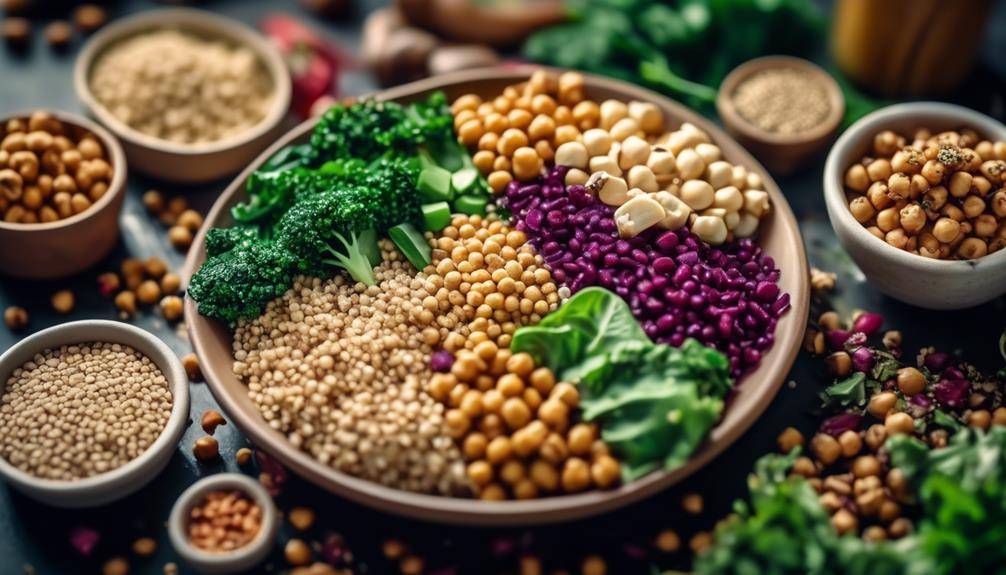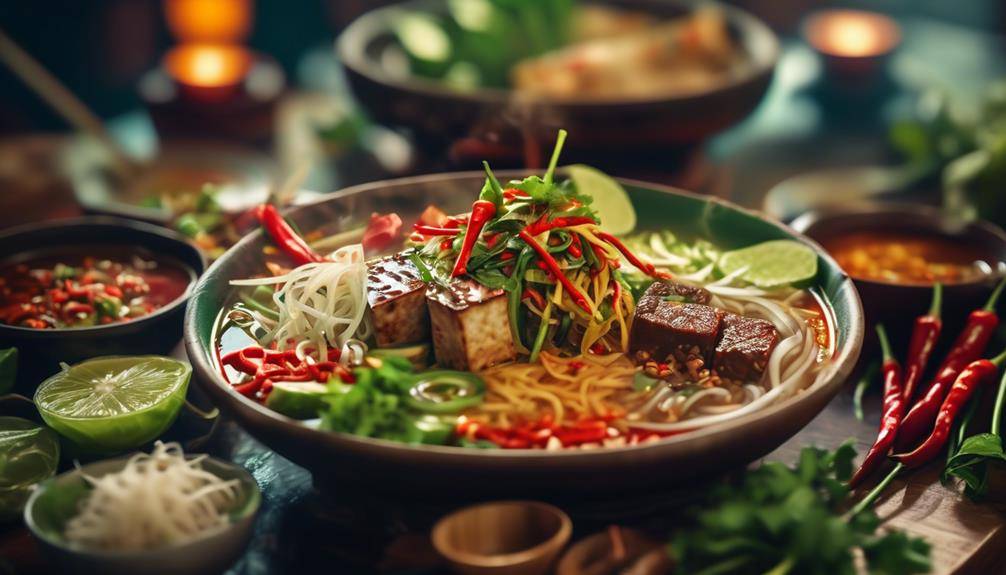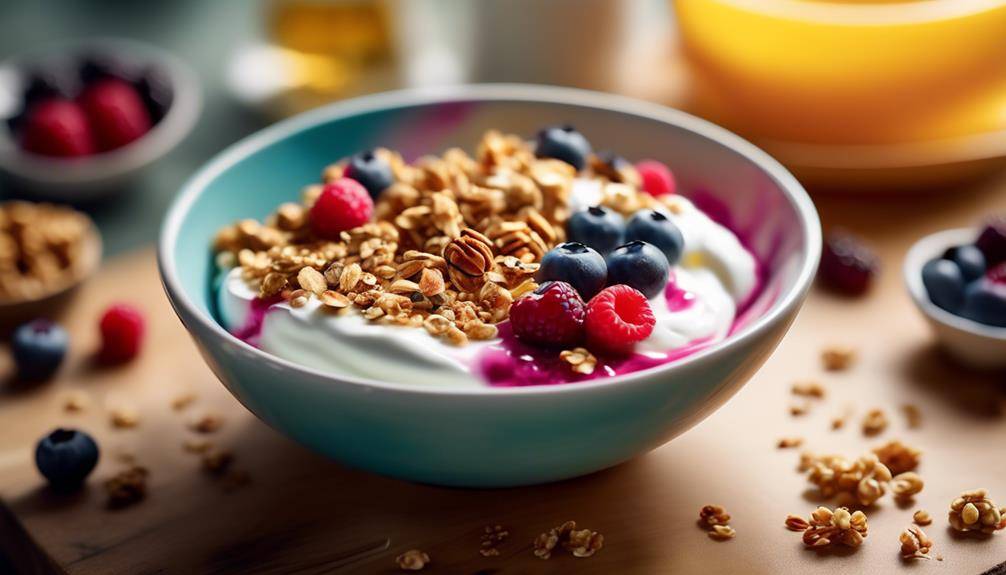How To Meet Protein Needs on Vegan Diet

Meet Protein Needs on Vegan Diet; Did you know that 9.7 million adults in the United States follow a vegan diet? With the rising popularity of plant-based eating, it’s important to address a common concern: meeting protein needs. Whether you’re a lifelong vegan or just starting to explore the benefits of a plant-based lifestyle, understanding how to obtain an adequate amount of protein is crucial. But fear not, because in this discussion, we will uncover the secrets to meeting your protein needs on a vegan diet, ensuring that you can thrive in your plant-powered journey.
Importance of Protein on a Vegan Diet
To ensure optimal health on a vegan diet, it is crucial to understand the importance of meeting your protein needs. Many people worry about protein deficiency when following a plant-based diet, but with proper planning, it is entirely possible to meet your protein requirements. Protein is essential for various functions in the body, including muscle growth and repair.
One of the main concerns regarding protein on a vegan diet is the potential for deficiency. However, studies have shown that as long as you consume a variety of plant-based protein sources and ensure adequate caloric intake, meeting your protein needs is not a problem. Plant-based protein sources such as legumes, tofu, tempeh, seitan, and quinoa are all excellent options that can provide the necessary amino acids.
Protein plays a crucial role in muscle growth and repair. When you engage in physical activity, particularly strength training, your muscles experience microscopic damage. Protein is needed to repair and rebuild these muscles, resulting in muscle growth and increased strength. Research has consistently shown that both plant-based and animal-based proteins can support muscle growth when consumed in adequate amounts.
It is important to note that while meeting protein needs is vital, consuming excess protein does not necessarily lead to more muscle growth. The body has a limit to how much protein it can utilize for muscle synthesis. Consuming more protein than your body needs may not result in additional benefits and could be converted to fat or excreted.
Recommended Daily Protein Intake for Vegans
To meet your protein needs on a vegan diet, it is important to understand the recommended daily intake. The amount of protein you require depends on factors such as your age, sex, activity level, and overall health. Generally, it is recommended that adult vegans aim for around 0.8 grams of protein per kilogram of body weight per day.
Protein Requirements for Vegans
Meeting your protein needs on a vegan diet is crucial for maintaining optimal health and supporting various bodily functions. While it is a common misconception that vegans may struggle to meet their protein requirements, it is entirely possible to obtain an adequate amount of protein from plant-based sources. Here are some key points to consider regarding protein requirements for vegans:
- Adequate protein intake: It is important for vegans to consume enough protein to prevent protein deficiency and support muscle repair and growth.
- Recommended daily intake: The recommended daily protein intake for adults is around 0.8 grams per kilogram of body weight.
- Plant-based protein sources: Incorporating a variety of plant-based protein sources such as legumes, tofu, tempeh, seitan, quinoa, and nuts can help vegans meet their protein needs.
Plant-Based Protein Sources
Incorporating a variety of plant-based protein sources into your diet is essential for meeting the recommended daily protein intake for vegans. While whole plant foods such as legumes, tofu, tempeh, and seitan are excellent sources of protein, there are also plant-based protein supplements available. These supplements, often made from sources like pea, rice, or hemp, can be a convenient option to help you meet your protein needs.
However, it’s important to note that protein absorption factors also play a role in meeting your requirements. Factors such as the protein quality and the presence of other nutrients in your meals can affect how well your body absorbs and utilizes the protein. To optimize protein absorption, ensure you have a well-balanced diet with a variety of plant-based protein sources.
Meeting Protein Needs
Ensure you consume enough protein to meet the recommended daily intake for vegans by incorporating a variety of plant-based protein sources into your diet. Protein plays a crucial role in muscle growth and repair, making it essential for vegans who engage in physical activities or exercise regularly. To meet your protein needs, consider the following options:
- Legumes: Including beans, lentils, and chickpeas, these are excellent sources of protein and can be added to soups, salads, or used as the main ingredient in dishes like chili or hummus.
- Grains: Quinoa, brown rice, and whole wheat products like bread and pasta contain protein. Incorporate these into your meals for an extra protein boost.
- Protein supplements: If you have difficulty meeting your protein needs through food alone, protein supplements such as pea, soy, or hemp protein powders can be a convenient option.
Complete Plant-Based Protein Sources
What are some complete plant-based protein sources that can meet your protein needs on a vegan diet? When following a vegan diet, it is important to ensure that you are consuming enough protein and that it is of high quality. Protein quality refers to the presence of essential amino acids, which are the building blocks of protein that our bodies cannot produce on their own. Fortunately, there are several complete plant-based protein sources that can provide all the essential amino acids you need.
One excellent complete plant-based protein source is quinoa. Quinoa is not only high in protein, but it also contains all nine essential amino acids, making it a great choice for vegans. Another option is soybeans and soy products, such as tofu and tempeh. Soybeans are one of the few plant-based sources that provide all the essential amino acids. Additionally, lentils are a fantastic plant-based protein source that is not only rich in protein but also contains all the essential amino acids. They are also a great source of iron and fiber.
Chia seeds are another complete plant-based protein source that can easily be incorporated into your diet. They are packed with essential amino acids, omega-3 fatty acids, and fiber. Other complete plant-based protein sources include hemp seeds, buckwheat, and spirulina.
Legumes: The Powerhouse of Vegan Protein
To continue exploring plant-based protein sources, let’s now focus on the nutritional powerhouse of legumes. Legumes, such as beans, lentils, and chickpeas, are not only delicious and versatile but also rich in protein, making them a vital component of a vegan diet. Here are some key reasons why legumes are the go-to source for vegan protein:
- High protein content: Legumes are packed with protein, making them an excellent choice for vegans looking to meet their protein needs. For example, a cup of cooked lentils contains about 18 grams of protein, which is comparable to the protein content found in animal-based sources.
- Essential amino acids: Although legumes are not considered a complete protein source on their own, they can be combined with other plant-based proteins to provide all the essential amino acids needed by the body. By incorporating a variety of legumes into your diet, along with other plant-based protein sources like quinoa or tofu, you can ensure you’re getting a complete range of amino acids.
- Fiber-rich: Legumes are not only a great source of protein but are also high in fiber. This fiber content promotes digestion, helps stabilize blood sugar levels, and contributes to overall gut health. Including legumes in your diet can also help you feel fuller for longer, aiding in weight management.
- Versatility: Legumes come in various forms, including canned, dried, or even as vegan protein supplements. This versatility allows you to easily incorporate legumes into your meals, whether it’s a hearty bowl of chili, a creamy hummus dip, or a protein-packed salad.
Nuts and Seeds: Nature’s Protein-packed Snacks
Looking for a protein-packed snack? Nuts and seeds are nature’s answer. Not only are they delicious, but they also offer a range of nutritional benefits, including protein, healthy fats, and essential minerals. Incorporating nuts and seeds into your meals is a simple way to boost your protein intake on a vegan diet.
Nutritional Benefits of Nuts and Seeds
Nuts and seeds offer a plethora of nutritional benefits, making them nature’s protein-packed snacks. Here are some reasons why they should be a staple in your diet:
- Nutritional benefits:
- Rich in essential nutrients: Nuts and seeds are packed with vitamins, minerals, and antioxidants that support overall health.
- Heart-healthy fats: They contain monounsaturated and polyunsaturated fats, which can help lower bad cholesterol levels and reduce the risk of heart disease.
- Fiber-rich: Nuts and seeds are excellent sources of dietary fiber, aiding in digestion and promoting feelings of fullness.
- Plant-based protein: Despite being plant-based, nuts and seeds are high in protein, making them a valuable source for vegans and vegetarians.
Incorporating nuts and seeds into your diet can provide a range of nutritional benefits, including their protein content, which is essential for maintaining a healthy and balanced vegan lifestyle.
Incorporating Nuts and Seeds Into Meals
Incorporate the protein-packed goodness of nuts and seeds into your meals for a nutritious and satisfying plant-based option. Not only do nuts and seeds provide a good amount of protein, but they also offer a wide range of health benefits. You can get creative with incorporating nuts and seeds into your meals by adding them to salads, stir-fries, or even making homemade nut butter. You can also use them as a crunchy topping for oatmeal or yogurt.
In addition to their protein content, nuts and seeds are rich in healthy fats, fiber, vitamins, and minerals. They have been shown to improve heart health, lower cholesterol levels, and reduce the risk of chronic diseases. So go ahead and explore the many creative recipes that incorporate nuts and seeds for both their delicious taste and their numerous health benefits.
Whole Grains: Fueling Your Protein Needs
To meet your protein needs on a vegan diet, incorporating whole grains into your meals can be a nutritious and satisfying option. Whole grains are an excellent source of plant-based protein and offer a wide range of health benefits. Here are some reasons why whole grains should be a part of your protein-packed vegan diet:
- Whole grains provide a good amount of protein: Whole grains like quinoa, brown rice, and whole wheat contain a decent amount of protein. For example, one cup of cooked quinoa contains 8 grams of protein. This makes them a valuable addition to your meals when you’re aiming to meet your protein needs.
- Whole grains are satisfying and help with weight loss: Due to their high fiber content, whole grains can keep you feeling full and satisfied for longer. This can be particularly beneficial if you’re trying to lose weight. By incorporating whole grains into your meals, you can fuel your protein needs while also promoting satiety and supporting your weight loss goals.
- Whole grains can be paired with fruits for a protein boost: If you’re looking to further increase your protein intake, you can pair whole grains with fruits. Fruits like bananas, strawberries, and blueberries are not only delicious but also contain small amounts of protein. Combining them with whole grains in dishes like oatmeal or whole grain salads can give you an extra protein boost.
Incorporating whole grains into your vegan diet is a simple and effective way to fuel your protein needs. Whether you’re looking to maintain a healthy weight or support weight loss, whole grains provide a nutritious and satisfying option for meeting your protein requirements.
Incorporating Tofu and Tempeh Into Your Vegan Diet
Adding tofu and tempeh to your vegan diet can provide a valuable source of protein and enhance the variety of your meals. Tofu is made from soybeans and is a versatile ingredient that can be used in a variety of dishes. It is low in calories and contains all nine essential amino acids, making it a complete protein source. Tofu is also rich in iron, calcium, and magnesium, which are important for maintaining healthy bones and muscles.
There are numerous tofu recipes that you can try to incorporate this plant-based protein into your diet. You can use firm tofu in stir-fries, scramble it as a replacement for eggs, or marinate and grill it for a delicious protein-packed meal. Silken tofu can be blended into smoothies or used as a base for creamy desserts. With its neutral taste, tofu can easily absorb the flavors of the dishes you prepare, making it a versatile and tasty addition to your meals.
Tempeh, on the other hand, is made from fermented soybeans and has a nutty flavor. It is also a complete protein source and contains high amounts of fiber, vitamins, and minerals. Tempeh is rich in probiotics, which promote a healthy gut and improve digestion. It is also a good source of antioxidants, which help protect your body against oxidative stress.
To incorporate tempeh into your vegan diet, you can slice it and pan-fry it as a meat substitute, crumble it to make a flavorful taco filling, or marinate and bake it for added texture and taste. Tempeh can also be added to salads, sandwiches, and stir-fries to boost the protein content of your meals.
Superfoods for Protein Boost: Spirulina and Chia Seeds
Spirulina and chia seeds are two superfoods that can provide a protein boost to your vegan diet. These nutrient-rich foods offer a range of benefits that can support your overall health and well-being. Here’s why you should consider incorporating them into your meals:
- Spirulina Benefits:
- High Protein Content: Spirulina is a blue-green algae that packs a powerful protein punch. Just one tablespoon of spirulina powder provides about 4 grams of complete protein, containing all the essential amino acids your body needs.
- Rich in Antioxidants: Spirulina is loaded with antioxidants, such as phycocyanin, which can help protect your cells from damage caused by free radicals. Antioxidants also play a role in reducing inflammation and promoting overall health.
- Immune System Support: Spirulina contains a variety of vitamins and minerals, including iron, vitamin B12, and vitamin C, which are essential for a strong immune system. Including spirulina in your diet can help support immune function and ward off illnesses.
- Chia Seed Recipes:
- Chia Pudding: Chia seeds can be soaked in plant-based milk, sweetened with a natural sweetener like maple syrup or agave, and topped with fruits and nuts to create a delicious and protein-packed chia pudding. This creamy treat is not only a great source of protein but also provides fiber and healthy fats.
- Chia Smoothies: Adding chia seeds to your favorite smoothies can boost the protein content and provide a thick and creamy texture. Simply blend your preferred fruits, vegetables, and plant-based milk with a tablespoon or two of chia seeds for an extra nutritional boost.
Incorporating spirulina and chia seeds into your vegan diet can be a simple and effective way to increase your protein intake. Whether you choose to enjoy spirulina in smoothies or chia seeds in puddings, these superfoods offer a range of health benefits that can support your optimal well-being.
Protein-rich Vegetables to Include in Your Meals
Incorporating protein-rich vegetables into your meals is a smart and delicious way to meet your nutritional needs on a vegan diet. Not only are vegetables packed with essential vitamins and minerals, but they also contain a surprising amount of protein. Adding these protein-rich vegetables to your meals can help ensure that you get enough protein to support your body’s functions and maintain muscle mass.
Broccoli is a versatile and protein-rich vegetable that can be easily incorporated into your meals. Just one cup of cooked broccoli provides about 3 grams of protein. You can enjoy it steamed, roasted, or stir-fried, and it pairs well with a variety of flavors and seasonings.
Another protein-rich vegetable to include in your meals is spinach. This leafy green is not only high in iron and vitamins, but it also contains about 5 grams of protein per cooked cup. Add it to salads, stir-fries, or even smoothies for an extra protein boost.
Peas are also a great source of protein, with about 8 grams per cooked cup. They are a versatile vegetable that can be used in soups, stews, or as a side dish. You can even blend them into protein-rich smoothie recipes for a refreshing and nutritious drink.
If you have a sweet tooth, you’ll be glad to know that there are protein-packed vegan desserts that feature vegetables. For example, black bean brownies are a delicious and protein-rich option. By substituting flour with black beans, you can enjoy a decadent treat with about 8 grams of protein per serving.
Incorporating protein-rich vegetables into your meals not only provides the necessary amino acids for your body but also adds variety and flavor to your vegan diet. Experiment with different recipes and enjoy the benefits of these nutritious and delicious vegetables.
Balancing Macronutrients for Optimal Protein Absorption
To ensure optimal protein absorption, it is important to balance macronutrients in your vegan diet. By following these protein absorption techniques and tips, you can maximize the benefits of the protein-rich foods you consume:
- Pair proteins with carbohydrates: Consuming carbohydrates alongside proteins can enhance protein absorption. Carbohydrates stimulate the release of insulin, which promotes the uptake of amino acids into your muscles. Opt for whole grains, such as quinoa or brown rice, as a source of carbohydrates to accompany your protein-rich meals.
- Include healthy fats: Adding healthy fats to your meals can also improve protein absorption. Fats help slow down the digestion process, allowing your body more time to break down and absorb amino acids effectively. Incorporate sources of healthy fats, like avocados, nuts, and seeds, into your meals to enhance protein absorption.
- Consider digestive enzymes: Digestive enzymes can assist in breaking down proteins into smaller, more easily absorbed molecules. Enzymes like bromelain, found in pineapples, and papain, found in papayas, can aid in protein digestion. Including these fruits in your vegan diet may support optimal protein absorption.
- Avoid excessive fiber intake: While fiber is important for overall health, consuming excessive amounts of fiber with protein-rich meals can interfere with protein absorption. High fiber foods, like legumes and certain vegetables, can bind to proteins and hinder their digestion. Be mindful of your fiber intake and balance it with your protein consumption.
Meet Protein Needs on Vegan Diet; Frequently Asked Questions
Can You Meet Your Protein Needs on a Vegan Diet Without Consuming Any Supplements or Fortified Foods?
You can meet your protein needs on a vegan diet without supplements or fortified foods. It’s possible to obtain sufficient protein from plant-based sources such as legumes, tofu, tempeh, seitan, quinoa, and hemp seeds.
Are There Any Specific Cooking Methods That Can Enhance the Protein Content of Plant-Based Foods?
Cooking methods can enhance the protein content of plant-based foods. Grilling, sautéing, and baking can help retain more protein compared to boiling or steaming. Incorporating these techniques into your vegan diet can boost your protein intake.
Can You Provide a Sample Meal Plan That Meets the Recommended Daily Protein Intake for Vegans?
To meet your protein needs on a vegan diet, you can follow a sample meal plan that includes a variety of plant-based proteins like legumes, tofu, tempeh, and quinoa. Supplements and fortified foods can also help ensure you get enough protein. Cooking methods can enhance protein content, but it’s important to consider protein quality and the drawbacks of relying solely on plant-based sources.
How Does the Protein Quality of Plant-Based Sources Compare to Animal Sources?
When comparing the protein quality of plant-based sources to animal sources, it’s important to evaluate the amino acid composition and bioavailability. Plant proteins can be just as high-quality when combined properly, ensuring you meet your protein needs on a vegan diet.
Are There Any Potential Risks or Drawbacks Associated With Consuming High Amounts of Plant-Based Proteins?
Eating high amounts of plant-based proteins may pose potential risks and nutritional deficiencies. It’s important to ensure you’re getting a variety of protein sources to meet your needs and consulting a nutritionist for guidance.
Conclusion
In conclusion, meeting protein needs on a vegan diet is entirely possible by incorporating a variety of complete plant-based protein sources. Legumes, nuts, seeds, tofu, tempeh, spirulina, chia seeds, and protein-rich vegetables are all excellent options. It is essential to balance macronutrients to ensure optimal protein absorption. By following these guidelines, vegans can easily meet their daily protein requirements while enjoying a nutritious and diverse diet.








